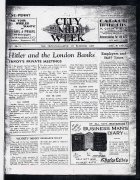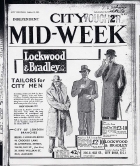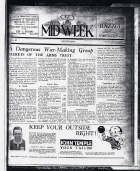Found Pages: The Remarkable Harold Ernest (“Darcy Glinto”) Kelly, 1899–1969.
Sidebar 10: City Mid-Week I (1931–32)
I
In his Foreword to London Cameos (1951), Harold Kelly writes:
Close on fifteen years ago, two free-lance journalists, with an intrepidity worthy of a latter-day Wat Tyler and Lambert Simnel, launched a daring assault upon the City. It took the form of a weekly newspaper, “City Mid-Week.” The objects of the paper, as formulated by the founders—to themselves—was to send the existing staid, respectable, old-established City paper mouldering down to a despised oblivion, to stagger Fleet Street by its “scoops” and the high literary level of its features and comments, and to shake the whole City to its foundations by digging out its most cherished and esoteric secrets to the light of print.
It is pleasant to be able to recall that, although the venture was ultimately swept away, it ended in disaster, not failure. Some perverted facts, obtained and published in good faith, were judged to be a libel upon one of the world’s greatest financial corporations. Damages of fifty-thousand pounds were awarded against “City Mid-Week.” That wrote finis.
Yet by the time the fatal injunction was served more than forty issues of the paper had appeared, sales had been built up to over twenty thousand copies a week, Fleet Street had taken notice, and the City Fathers, civic, financial, and commercial, had frequently trembled—even if more often in rage than with alarm. …
Then came, as it seemed, the oblivion we had planned for the more substantial rival organ. “City Mid-Week” lay under permanent injunction, one founder returned to an old association with Reuter’s, the other [Kelly himself] to his free-lancing (pp.xiii…xiv).
I have obtained photocopies of the first and last issues (#1, December 9, 1932, and #46, October 19, 1932) from the British Library. For reasons of copyright, I think that’s all that I’m allowed by this route.
City Mid-Week II contains new information.
II
Each issue consists of twenty pages, approximately 12"x10".
The address is given, but no names of staff, which would have been normal back then. Some items are signed identifiably, some pseudonymously, some not at all. Kelly’s name only appears after a couple of Cameos, but he is presumably the “H.K.” who did the report in the first issue on amateur theatricals and music recitals.
The following is on one of the pages that I have acquired more recently.
THE STAFF
Editor: J.R. Jarvie.
Manager: O.P. Maclaren.
Advertisement Manager: C.S. Hayes
Statt & Weekly Contributors:
Mrs. Cecil Chesterton, James Dee, Balfour D. Hume (Sports), Harold Kelly, D. King-Page, Peggy Langleben, R.A. Lovell and J.F. Watson.
Well, that certainly settles the identities of the editor and managing editor. But it would seem, if anything, to leave more room for Kelly as a writer of more than just his signed pieces.
The first issue contains forty-two ads, one of them full-page, plus a half page of classifieds. The last has three full-page ads (one of them for tailor-made gentlemen’s lounge suits and top-coats to die for, at two-and-a-half pounds, but this was when, as mentioned in the paper, a City typist was paid three pounds a week) and twenty smaller ones.
The quasi-editorial on the second page of the first issue, headed simply “Ourselves,” opens with the statement:
It is usual for a journal in its first number, not only to explain the nature of its appeal, but to reveal the urge which prompted its proprietors to consume their capital and energy in the moral or political regeneration of the people.
We do not propose putting so severe a strain on the patience of the somewhat matter-of-fact men and women who spend their business hours in the City of London, and among whom we hope to recruit our circulation.
The object in publishing City Mid-Week is commercial. We believe that there is a public for the paper sufficiently numerous to earn an honest profit for ourselves. We know that if we are mistaken, no amount of editorial egotism will mend the situation. We leave it at that.
They explain that the paper is not being carried on railway bookstalls (a major mode of distribution) because it is priced at a penny and not the customary twopence.
[W.H.] Smith’s are the dominating force in the wholesale newspaper distributing business. They have also, as we have said, a virtual monopoly of the English railway bookstalls.
Beyond that they own a large number of bookshops, including many of the best situated in London and the provincial towns. Their influence over the book and newspaper press is therefore enormous.
Smith’s are far too powerful. A price-fixing combination may or may not be a bad thing for the public. We believe that in this country the benefits of combination in the majority of industries have outweighted the evils.
But a combination which, beyond fixing prices, can, at will, stifle the free expression of ideas through price is an iniquity.
III
The first issue, with an important exception, is not muckraking. Turning the pages, I see (selectively):
A gentle sermonette on business morality by Dr. Norwood of the City Temple;
a City Cameo (signed) by Harold about a City bell-ringer;
a profile of the Chief Harbour Officer of the Port of London;
a friendly piece about the City police;
a signed complaint about pollution by an unelectrified railway line;
a friendly report on a proposed new luxury cinema in the City;
a signed news column about things like an ancient lime tree, the conversion of cheques, the attractive blue curtains on a bank’s windows, a new insurance policy, and the growing presence of women in the city (with reduced openings for men);
a letters page;
the first installment of an advice column for City women by a woman;
the first installment of a column by G.K. Chesterton’s sister-in-law about women’s fashion;
an unsigned column about the exorbitant fees of printers;
a news column about City individuals and activities;
a column about the spice-trade; a list of church events; a full page about amateur theatrical and music recitals;
four-and-a-half pages about the activities of City sports teams.
It reads as though the City of London were indeed a small city.
The exception to this collegiality is “Hitler and the London Banks,” a front-page article speculating about the import of a private visit to the City by Hitler’s emissary Alfred Rosenberg, and the financial policies to be expected from Hitler if he comes to power, the principal point being that he is likely to default on reparations to the French but not on commercial debts. “For this reason, British finance is looking with a kindly and even a hopeful eye on Adolf.”
The anonymous writer adds, “Whether the financial group who have an interest in seeing a virile anti-reparations and therefore anti-French Government in power in the German Reichstag will be able to influence British foreign policy, remains to be seen.”
IV
The final issue has additions like an airy sketch in straight lines of the Prince of Wales, a five-page Literary Review (its first page devoted to “A New Way to Teach Golf”), a couple of lists of the principal runners in upcoming horse-races, and a crossword puzzle.
It also contains: a column in which The Wise Owl Wants to Know things like,
“Why the members of the Irish Republican Army went to Belfast to lend a hand in causing trouble.”
“How long the Disarmament Conference farce will be allowed to continue. And how long it will be before Germany declares, not that she will re-arm, but that she has already done so for land purposes.”
“Whether the propaganda in the weekly newspaper known to be subsidized by [Prime Minister] MacDonald’s friends is taken seriously by the Conservatives in the [Coalition] Government.”
“Who is behind the Dutch protest against the ‘City Mid-Week’ German army revelations”
“How many bandits have bought the new rubber truncheons sold as a protection against bandits.”
Wartime Prime Minister Lloyd George is lambasted in an article by “Judex” for his self-serving recent revisionism about the causes of the Great War, and his hand in “one of the worst peace treaties in history.”
A new quarterly called New Britain, “of great significance,” is given a two-column article welcoming it “as the mouthpiece of that growing body of thinkers in this country who see in the existing financial system the true cause of the world’s ills, and who have a clear policy for its overthrow.” It alludes to “a fascinating, but ghastly” episode described in it that shows “the real mentality of the individuals who control finance and, therefore, our lives.”
According to the British Library online catalogue, New Britain ran until March 1936 and was “a weekly organ of the 11th hour group,” whatever that was.
V
Lastly, there’s the front-page article, “A Dangerous War-Making Group: Secrets of the Arms Trust.” It opens with a reminder of the infamous Sir Basil Zaharoff’s role in the pre-War armaments race; goes on to name four Government officials (including Arthur Balfour) who had armaments connections when the 1914 war broke out; recalls that the armaments used by the Turks at Gallipoli had been provided by Vickers; and settle down to talk about how
the lists of shareholders of the great armament combine still contain the names of men who play a prominent part in our public life, and who, if they were disposed, are able to influence our international policy. Also, under the system of multi-directorships the directorate of this combine is linked up with the directorates of the most important financial concerns.
The names of nine Establishment figures are given, together with the numbers of their shares in Vickers as listed in that firm’s Annual Report.
VI
I can’t be the only person to have surmised that the false information that put City Mid-Week out of business may have been a plant.
The City Mid-Week story is poignant, both for the extinction of a good weekly and for all the hopes and effort that Kelly and his partner had obviously invested in it. I haven’t been able to find out anything about the trial.
The trial isn’t mentioned in G.K. Chesterton’s maverick (and odiously antisemitic) G.K’s Weekly. I would think it might be noticed in the New English Weekly, founded by A.R. Orage. Its politics don’t seem obviously either Left or Right.
VII
Given the later interest of “Eugene Ascher” in the supernatural, I would guess that Kelly did the piece in the final issue about fake photos of spirits.
That spirit bodies exist, no reasonable person will deny.
The evidence is too overwhelming, and does not depend on the modern enquiries of the Psychical Research Society and the spiritualist movement. All through the ages, the majority oif mankind have believed without question that at death there is a spirit body which is released from the physical body, and continues its existence in another plane (p.4).
As to other pieces by Kelly, it’s anyone’s guess. But presumably he or his partner wrote those front-page stories.
VIII
Corrections and clarifications: NEW
Thanks to reference librarian Maureen at our Regional Library, I have now (September 2008) been able to go, first to J.R. Spencer, “Criminal Libel in Action—The Snuffing of Mr. Wicks,” Cambridge Law Journal, 38, April 1979, 60–78, and thence to a report in the London Times of March 22, 1933 of the trial in the High Court of Justice, King’s Bench Division, in which Sun Life of Canada was awarded damages amounting to £19,000 for having been libeled in City Mid-Week.
The quotations below are paraphrases or précis of the arguments.
Sir Patrick Hastings, a legal heavy, represented Sun Life. John Ramadge Jarvie, described here as Managing Editor, though listed as Editor in the paper, represented himself. “The defendant’s defences had been struck out for non-compliance with orders of the Court, and the only issue, therefore, was the question of damages.”
The Sun Life Assurance Company of Canada was one of the largest life assurance companies in the world, and it enjoyed a reputation that was second to none. The British International Press, Limited, was incorporated in 1931 with a capital of £1000 [at least £50,000 now] to carry on the City Mid-Week. The company was now in liquidation. Mr. Jarvie, who was a director of the company, had recently been adjudicated bankrupt.…
The City Mid-Week came into existence at the beginning of 1931. [December 1931, actually.] It approached the plaintiff company and asked for advertisements. For the first few issues the plaintiff company advertised in the newspaper. It then stopped doing so.
In July 1932 it published the two editorials in question, with their defamatory statements.
A poster bearing the words “More Grave Sun Life of Canada Disclosures” was issued at the same time. That poster was exhibited and copies of the newspaper were sold outside the head office and branch offices of the plaintiff company in London. …
There was not a shadow of foundation for the statements in the libel. …Its directors were men of the highest honour and integrity and included Prime Ministers of Canadian Provinces. Its accounts were audited by the Canadian Government auditors …
Mr. JARVIE (cross-examining).—Did he ever suggest that, if the company did not advertise in the newspaper, the newspaper would criticize the company?—He made no such suggestion.
The heavily punitive damages awarded were merely formal, since the defendants were already bankrupt.
IX
So how had it all come about?
The principal offending editorial, according to Steve Holland, was written by Henry William Wicks, not himself a member of the CMW team, whose litigious doings and the legal implications of a major verdict against him are the subject of the article in the Cambridge Law Journal.
Wicks, it seems, had been a Sun Life agent in Malta and Liverpool from 1923 to 1931, when he moved to a rival company because of rumours about Sun Life’s instability, taking with him a grudge against Sun Life because of money that he believed was owing to him. CMW evidently caught him, or he them, at the start of an elaborate four-year guerrilla campaign against Sun Life that resulted in an obviously exasperated judiciary sentencing him to thirteen months imprisonment for criminal libel. And his litigations would continue.
Spencer says of him,
Mr. Wicks believes that for the last forty-five years he has been the victim of a plot, engineered by insurance companies in league with Cabinet Ministers and the secret service, to punish him for trying to tell the truth about financial scandals in and after the Great Depression. Most of his more original pieces of litigation, in which he has generally appeared in person, have been designed to uncover this plot. (77)
Spencer also says, however, that a dangerous precedent was set in Wicks’ being condemned for criminal rather than merely civic libel, since now anyone found guilty of defamation could find him- or herself imprisoned rather than simply having to pay damages.
Which obviously further protects the rich, and powerful, and expensively lawyered.
Steve Holland’s account gives the impression that there was a larger corporation called The British International Press which had condescended to let CMW run for a bit until it became more trouble than it was worth. In fact, so far as I can see, the British International Press was simply incorporated by Jarvie (and Kelly?) in 1931 to facilitate the establishment of CMW.
I can also report, as the result of a bit of googling, that Jarvie was born in Alva, Scotland, in 1890, joined the National Union of Journalists in 1918, and lived on, mostly in Central London, until 1948.
If Kelly’s account of the founding of CMW is correct, he himself worked for Reuters in the Twenties and Thirties. He could have very well been in the War and acquired a strong aversion from militarism there.
I have a reference to a couple of pieces by him: “Max Pelmanism,” Journalist, November 1920, 104, and “Storytelling,” Writer, January 1922, back cover. Pelmanism was a method of training one’s memory so as to become more self-assertive and effective.
Sidebars:
- Sidebar 1. Some Orchids
- Sidebar 2. Chase and Glinto
- Sidebar 3. The Pre-trial Glintos
- Sidebar 4. Deep South Slavery
- Sidebar 5. Darcy Janson
- Sidebar 6. Rogues’ Gallery
- Sidebar 7. Kelly Brothers
- Sidebar 8. Scandal
- Sidebar 9. Westerns
- Sidebar 11. Gangdom
- Sidebar 12. Jungle Books
- Sidebar 13. Bodily Harms
- Sidebar 14. Propaganda?
May 2006



